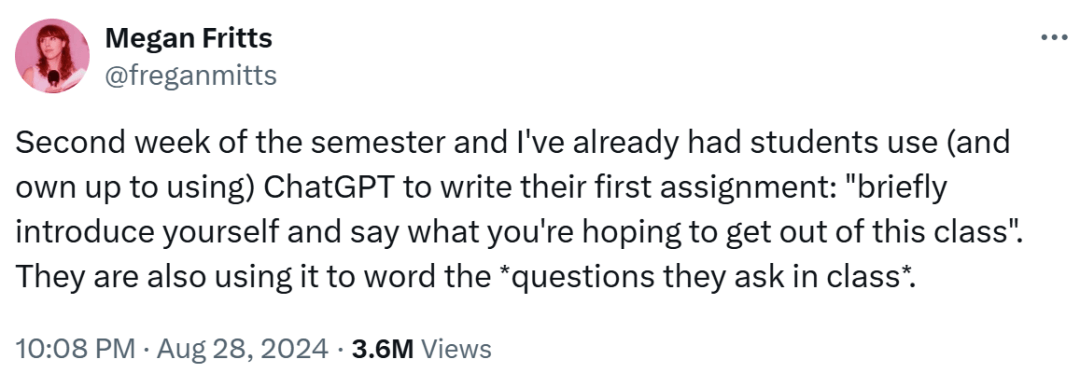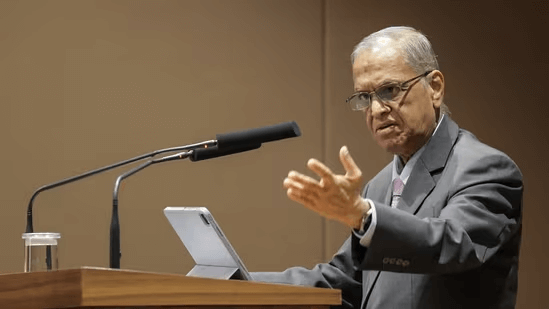As AI reshapes education, debates arise about its impact on student thinking, academic integrity, and the balance between technological use and human cognition.
Recently, a post by Megan Fritts, a professor at a U.S. university, on the social media platform X has sparked widespread attention and heated debate:
"During the second week of the semester, I discovered that some students had already used (and admitted to using) ChatGPT to write their first assignment: 'Briefly introduce yourself and explain what you hope to gain from this course.' Not only that, but they also used ChatGPT to generate questions for class discussions."

Fritts was surprised, as she believed this was a simple task that could easily earn students high marks. She was shocked to see some students choose to use ChatGPT to generate their self-introductions: "They all admitted to using ChatGPT, and honestly, I was surprised by their honesty. But at the same time, I was shocked that even such a simple assignment made them feel the need to turn to an LLM."
ChatGPT is Not Equivalent to a Calculator in Mathematics
Professor Fritts shared her experience on X, and the post was quickly reposted and commented on by many. A lot of people believe that students resorting to AI for even low-level tasks is an inevitable trend.
In fact, opinions on the application of AI in education have long been polarized. Some people argue that ChatGPT, like a calculator in mathematics, is an effective tool that reduces students' workload, allowing them to focus more on understanding complex concepts and fostering innovative thinking. However, Professor Fritts believes this analogy is flawed.
She pointed out that calculators merely reduce the time spent on mechanical operations, helping students find a definite answer; meanwhile, the goal of education in the humanities is not to produce students who can mechanically solve problems but to "shape human beings." Through subjects like philosophy and literature, students should develop critical thinking skills and be able to reflect on questions they wouldn't normally consider in everyday life. Relying on AI for such thought processes goes against the very purpose of education.
"The goal of education is to create free minds—free individuals. Turning the thinking process over to machines clearly doesn't achieve this," said Professor Fritts. She explained that self-introductions generated by ChatGPT are often repetitive, formulaic responses that don't reflect the students' true thoughts, which is why she quickly realized the assignments were AI-generated.
With more and more students using AI to complete assignments, teachers are finding themselves in a dilemma. Fritts noted that while educators are responsible for teaching students how to use AI tools properly, it's unrealistic to place the full burden of preventing cheating on the teachers.
"Complaining About Technological Advancement Is an Overreaction"
Beyond concerns about academic cheating, Professor Fritts touched on a more profound issue: the impact of technology on students' cognitive abilities. She mentioned that many students have told her that their attention spans and reading abilities have significantly declined, and they are well aware that this is closely tied to their frequent use of technology.
● "I used to love reading when I was a kid, but now I can't. I can't even finish a single chapter of a book."
● "My attention span is terrible. I know it's because I'm always on my phone, always watching YouTube or TikTok."
Fritts referenced numerous studies indicating that modern technology, especially the fast pace of online information consumption, is changing people's reading habits. Many people no longer engage in deep reading but instead skim through information, skipping unnecessary details. She believes that this habit may have long-term effects on human cognition and thinking skills.
Furthermore, Professor Fritts emphasized: "Don't delude yourself into thinking that students are using AI because they're excited about new technology and just don't know how to use it correctly in the classroom—truthfully, everyone wants to be lazy and take the easy way out, even if they know it's wrong."
Comments under the X post showed that many people agreed with Professor Fritts' view:
● "I think when AI becomes too smart, it will destroy us; but I suppose making ourselves dumber by using it for everything also counts."
● "Kids need to understand that their future bosses already have access to more advanced, paid versions of ChatGPT. If all you can do is copy its output, you're not worth hiring."
At the same time, others felt that Professor Fritts' remarks were too extreme:
● "Throughout history, there have always been people who sounded alarmist about new technology, only to end up looking foolish later."
● "Complaining about kids using their phones is one thing, but criticizing technological advancement is a bit much."






